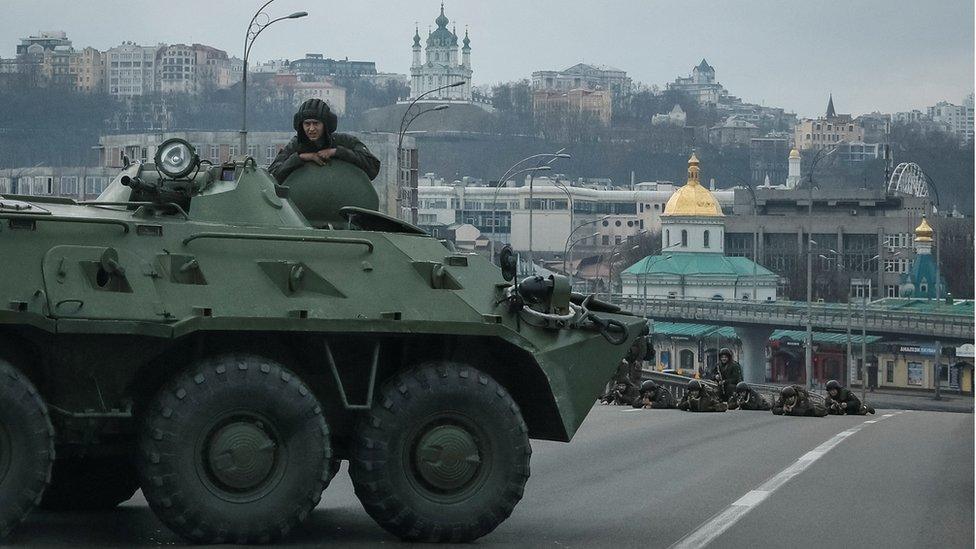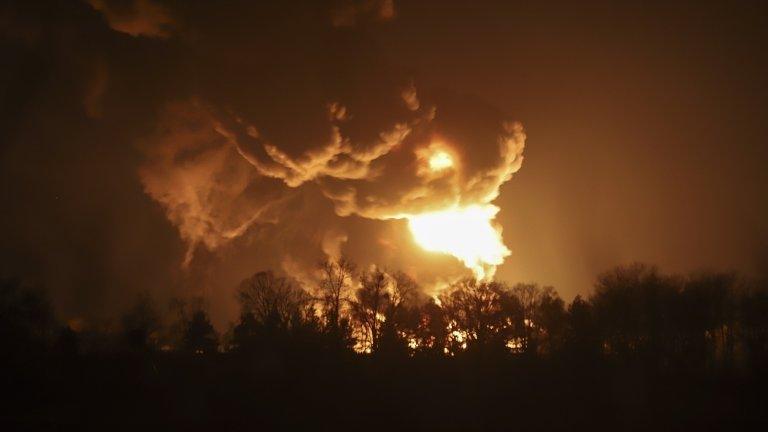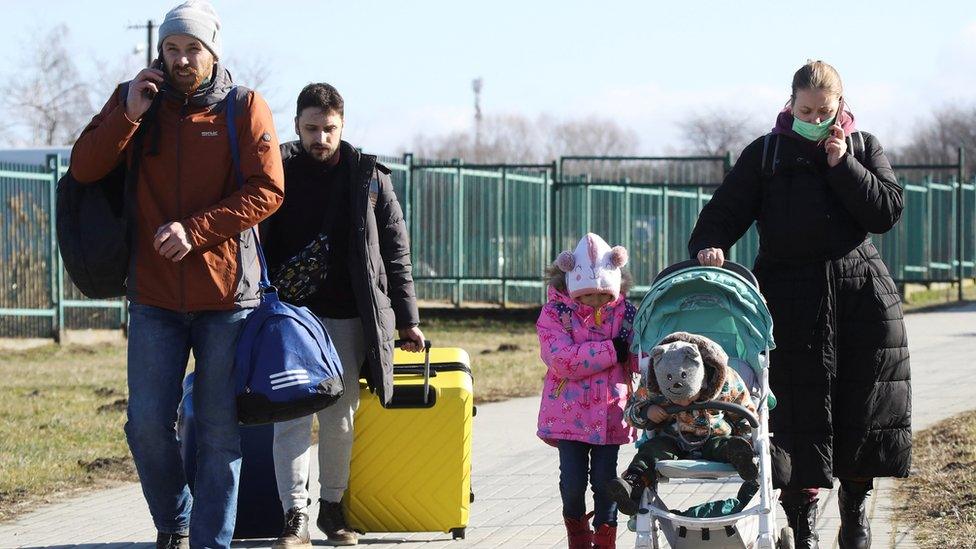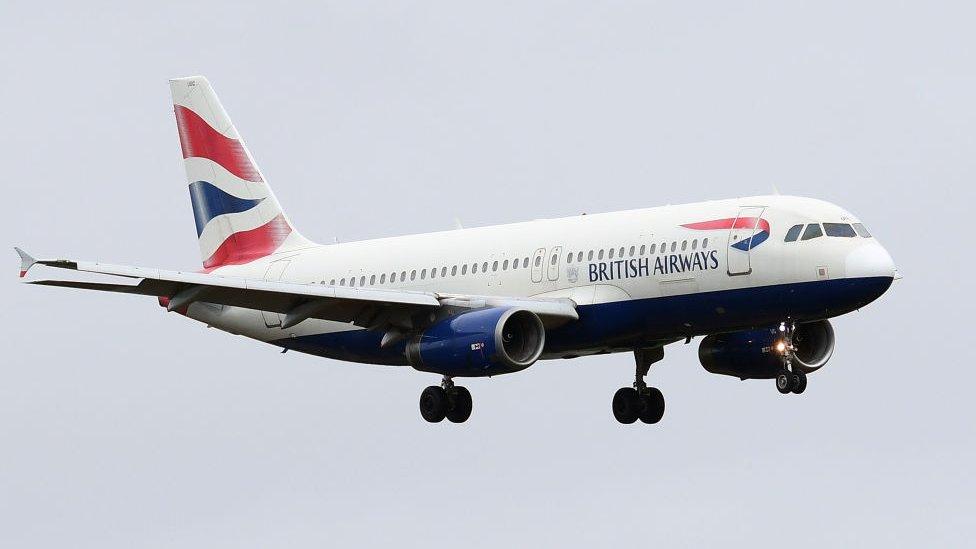Ukraine invasion: UK troops will not fight against Russia says Wallace
- Published
- comments
Wallace: We'd like to throw Russia out of Swift banking system
British troops will not be sent to Ukraine to fight Russia, Defence Secretary Ben Wallace has confirmed.
Speaking to the BBC, Mr Wallace said Ukraine would instead be supported to "fight every street with every piece of equipment we can get to them".
Russia launched its invasion of Ukraine on Thursday morning and its forces have now advanced on the capital Kyiv.
Mr Wallace said Russia failed in its main objectives on the first day of its offensive, losing 450 of its troops.
Over the past month, UK government ministers have repeatedly stressed that UK troops would be unlikely to take part in action within Ukraine.
Mr Wallace explained that sending UK troops to fight in Ukraine - an ally of the UK but not a member of the Nato military alliance it is part of - would trigger a European war.
He said the UK had "done the next best thing, which is to train more than 20,000 Ukrainians, provided them with lethal capabilities, which they are using right now".
Since the invasion began in the early hours of Thursday, 194 Ukrainians - including 57 civilians - have been killed, Armed Forces Minister James Heappey said.
Prime Minister Boris Johnson spoke to Ukrainian President Volodymyr Zelensky on Friday morning, pledging more support in coming days.
Mr Zelensky said Ukraine "needs the support of partners more than ever" and called for stronger sanctions.

Russia attacks Ukraine: More coverage
THE BASICS: Why is Putin invading Ukraine?
FROM KYIV: "There is no safe place any more"
FROM MOSCOW: Shock and support in Russian capital
IN MAPS: How Russia carried out the invasion

Kyiv was hit by blasts overnight and tanks have been filmed entering the city for the first time.
Fighting has also been raging at an airfield on Kyiv's outskirts and there have been reports of gunfire inside the city. Mr Zelensky has appealed to Russia for a ceasefire.
Meanwhile, UN estimates suggested more than 100,000 people have already fled their homes in Ukraine. Overnight, at least 1,000 Ukrainians arrived by train in Poland's south-eastern city of Przemysl alone.
Mr Heappey told the House of Commons that further troops were being sent to Estonia earlier than planned to help the Nato ally. A total of 1,000 troops are on standby to help Ukraine's neighbouring countries handle refugees fleeing Ukraine.
A Royal Navy destroyer, HMS Diamond, has set sail to be on standby in the eastern Mediterranean. The Type 45 destroyer is joining offshore patrol vessel HMS Trent, with four additional RAF Typhoon jets being deployed to Cyprus to take part in patrols.
HMS Diamond has also left Portsmouth Naval Base as part of the UK's response to support Nato countries in eastern Europe.
Mr Heappey said "British and Nato troops should not [and] must not play an active role" and that any miscalculation could escalate quickly.

Members of the Ukrainian National Guard in Kyiv on Friday
Mr Wallace warned Russian President Vladimir Putin would not stop after invading Ukraine.
But he said the decision not to "put British service personnel in direct fighting" was not about risk.
The defence secretary said: "I'm not putting British troops directly to fight Russian troops. That would trigger a European war because we are a Nato country and Russia would therefore be attacking Nato."
Asked about the possibility of a no-fly zone above Russia, he replied this would mean putting "British fighter jets directly against Russian fighter jets", adding: "Nato would have to effectively declare war on Russia because that's what you would do."
He called Russia's assault a "naked, aggressive, military invasion" and said he believed diplomacy was currently "absolutely off the table".
Nato - the North Atlantic Treaty Organisation - is a military alliance formed in 1949 by 12 countries, including the US, Canada, the UK and France.
Members agree to come to one another's aid in the event of an armed attack against any one member state, under its Article 5, external. Ukraine is not a member but wants to be - it is currently a Nato partner country, meaning there is an understanding it could be allowed to join in future.
Russia had wanted assurances this would never be allowed to happen.
The UK imposed new sanctions on Russia on Thursday, including targeting major Russian banks and oligarchs.
Sanctions will also be applied to Belarus, a long-term ally of Russia, for its role in the assault on Ukraine. Russian military convoys crossed from Belarus into Ukraine's northern Chernihiv region.
The Belarus ambassador to the UK, Maxim Yermalovich, was summoned to the UK Foreign Office over the invasion.
Minister for Europe and North America James Cleverly made clear Belarus had "aided and abetted" Russia's "reckless aggression", the Foreign Office said.
Parliament on standby
Mr Wallace also said work was under way to try to get the Swift international payment system "turned off for Russia". While that is the UK aim, the defence secretary said "like so many things these are international organisations, and if not every country wants them to be thrown out of the Swift system, it becomes difficult".
The prime minister is to use an extraordinary summit of leaders of Nato on Friday afternoon to press for Russia to be excluded from Swift, which allows financial transactions to be made around the world.
The UK Parliament is on standby to be recalled over the weekend as "further measures" and "further sanctions" are needed, Speaker Sir Lindsay Hoyle said.
In other developments on Friday, British airlines have been banned from travelling across Russian airspace or landing at its airports. It follows the UK decision to ban Russian airline Aeroflot from landing in the UK.

JUST HOW 'PUNK' IS BREWDOG? Looking for the truth behind claims of a toxic working culture
BUILT ON FAKERY: How did people from all over the word get entangled in the nets of 'Job Fishing'?'

- Published25 February 2022

- Published25 February 2022

- Published25 February 2022
